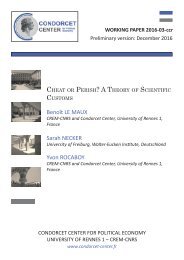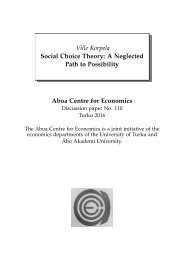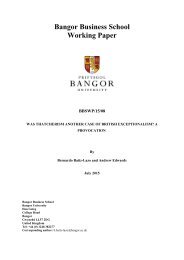MEMORANDUM
n?u=RePEc:hhs:osloec:2016_018&r=hpe
n?u=RePEc:hhs:osloec:2016_018&r=hpe
You also want an ePaper? Increase the reach of your titles
YUMPU automatically turns print PDFs into web optimized ePapers that Google loves.
Leontief had not yet published a single paper in an English language journal. The<br />
“familiarity” with Leontief’s interest in economic theory must have come from what<br />
Schumpeter had told Burbank, or from the few Harvard people who had studied the<br />
Versuch treatise, the only paper of importance Leontief had published so far. Had Burbank<br />
acquired over the grapevine impressions of Leontief from NBER, from Kiel or even from<br />
the AEA meeting in December 1931. Burbank was in any case convinced that Leontief<br />
was a brilliant candidate and had qualifications that Harvard particularly needed. 193<br />
Burbank’s question about Leontief’s interest in teaching international trade may have<br />
reflected an acute lacuna in the teaching plan. Leontief confirmed his interest in<br />
international trade and was soon after working on his first paper in English, on indifference<br />
curves in the analysis of foreign trade (Leontief 1933). The impulse for embarking on it is<br />
very likely to have originated in Burbank’s question.<br />
Burbank’s letter of 21 Jan. 1931, in which he apologized for having been so<br />
“indefinite” when they met in December, was followed by a flurry of telegrams to Leontief<br />
about details of Harvard’s offer. Leontief continued to keep Schumpeter updated about his<br />
talks with Harvard and the situation soon became more definite. Harvard offered a lecturer<br />
position for 1932/33, possibly to be converted into a professorship one year later. The<br />
teaching obligations were been stated as comprising “Modern Economic Theory” and<br />
“Price Analysis” to be given as full courses and an additional half-course on selected topics<br />
in international economics. Leontief commented to Schumpeter: “A bit much, but quite<br />
enticing!“ [Etwas viel, aber recht verlockend]. He was promised an assistant for his own<br />
research and the salary would be $3600, more than the average instructor.<br />
Harvard wanted an immediate commitment from Leontief but he wanted Schumpeter’s<br />
opinion before responding. He asked Schumpeter: “Would my prospects in Germany (if<br />
they still exist) deteriorate?” But was this tongue-in-cheek or an indication that Leontief<br />
had not yet finally given up Germany? At this point Leontief had become convinced that<br />
193 This may as good place as any other for a brief remark Leontief’s Jewishness (or lack of the<br />
same). One may wonder whether the extraordinary attention given to Leontief by Burbank would<br />
have been different if he had known that Leontief was the son of a Jewish mother. Burbank’s anti-<br />
Semitism is a well-established fact, not least from Paul Samuelson’s labeling of Burbank as “anti-<br />
Semite no. one in Harvard’s department of economics” (Backhouse (2014, pp. 61-62). McCraw<br />
(2007, p.202) writes that “Harvard was making every effort to entice Wassily Leontief, a brilliant<br />
young Jewish economist from Russia.” But it was hardly the case that Leontief was ever spoken (or<br />
thought) of as a “Jewish economist” or unimaginable that he thought of himself in such terms.<br />
Leontief’s status wrt. Jewishness was that from an orthodox point of view he was and would always<br />
remain a Jew. But as an immigrant to the United States he was not Jewish. I thank E. Roy<br />
Weintraub for this clarification.<br />
83





